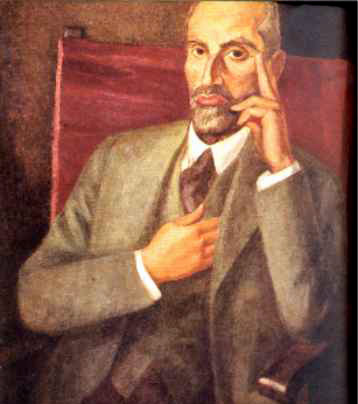- Juan Ramón Jiménez
Infobox Writer
name = Juan Ramón Jiménez
awards =Nobel Prize in Literature 1956

caption = Portrait of Juan Ramón Jiménez, byJoaquín Sorolla y Bastida .
birthdate = birth date|1881|12|24|mf=y
birthplace =Moguer ,Andalusia ,Spain
deathdate = death date and age|1958|5|29|1881|12|24|mf=y
deathplace = Santurce,Puerto Rico
occupation = poet
nationality = SpanishJuan Ramón Jiménez Mantecón (
Moguer ,Spain ,24 December ,1881 –Santurce,Puerto Rico ,29 May ,1958 ) was a Spanish poet, a prolific writer who received theNobel Prize in Literature in 1956. One of Jiménez's most important contributions to modern poetry was the idea of "poesía pura" ("pure poetry").Biography
Jiménez was born in Moguer, near
Huelva , inAndalusia ,Spain , on24 December ,1881 . He studied law at theUniversity of Seville , but he declined to put this training to use.Strongly influenced by the Nicaraguan poet
Rubén Darío , he published his first two books at the age of eighteen, in 1900. The death of his father the same year devastated him, and a resulting depression led to his being sent first to France, where he had an affair with his doctor's wife, and then to a sanatorium in Madrid staffed by novitiate nuns, where he lived from 1901 to 1903. In 1911 and 1912, he wrote many erotic poems depicting romps with numerous females in numerous locales. Some of them alluded to sex with novitiates who were nurses. Eventually, apparently, their mother superior discovered the activity and expelled him, although it will probably never be known for certain whether the depictions of sex with novitiates were truth or fantasy.In 1913, he met and fell in love with
Zenobia Camprubí , a noted translator of the Indian writer,Rabindranath Tagore . Shortly thereafter, he published a book of mildly erotic poems and made plans to publish the franker ones. But he abandoned his intention when Zenobia reacted to the first erotic book with disgust and ire.The remaining erotic poems were to remain secret until 2007, when about a hundred of them were published under the title, "Libros de amor" ("Books of love"). In the description by the book's editor, "without abandoning his profound lyricism and transcedence, Juan Ramón here reflects a very explicit eroticism and sexuality which were alien to the time and concretely to Spanish lyric poetry". ["Diario de Córdoba", 6 Jan 2007.] ["Guardian", 19 Jun 2007.] ["El Cultural", 14 Jun 2007]
He celebrated his home region in his prose poem about a writer and his donkey called "Platero y Yo" (1914). In 1916 he and Zenobia got married in the United States. Zenobia became his indispensable companion and collaborator.
Upon the outbreak of the
Spanish Civil War , he and Zenobia went into exile inCuba , theUnited States , andPuerto Rico , where he settled in 1946. Jiménez was hospitalized for eight months due to another deep depression. He later became a Professor of Spanish Language and Literature at the University of Maryland at College Park. The university later named a building on campus and a living-and-learning writing program in his honor.In 1956, he received the
Nobel Prize in Literature ; three days later, his wife died of vaginal cancer. Jiménez never got over this loss, and he died two years afterwards, on29 May ,1958 , in the same clinic where his wife had died. Both of them are buried inSpain .Legacy
Although primarily a poet, Jiménez achieved popularity in the United States with the translation of his prose work "Platero y yo" (1917; "Platero and I"). He also collaborated with his wife in the translation of the Irish playwright John Millington Synge's "Riders to the Sea" (1920). His poetic output during his life was immense. Among his better known works are "Sonetos espirituales 1914–1916" (1916; “Spiritual Sonnets, 1914–15”), "Piedra y cielo" (1919; “Stones and Sky”), "Poesía, en verso", 1917–1923 (1923), "Poesía en prosa y verso" (1932; “Poetry in Prose and Verse”), "Voces de mi copla" (1945; “Voices of My Song”), and "Animal de fondo" (1947; “Animal at Bottom”). A collection of 300 poems (1903–53) in English translation by Eloise Roach was published in 1962.
His literary influence on Puerto Rican writers is strongly marks the works of Giannina Braschi, René Marqués, and Manuel Ramos Otero.
Notes
References
* de Albornoz, Aurora, ed. 1980. "Juan Ramón Jiménez". Madrid: Taurus.
* Blasco, F. J. 1982. "La Poética de Juan Ramón Jiménez. Desarrollo, contexto y sistema". Salamanca.
* Campoamor González, Antonio. 1976. "Vida y poesía de Juan Ramón Jiménez". Madrid: Sedmay.
* Campoamor González, Antonio. 1982. "Bibliografía general de Juan Ramón Jiménez". Madrid: Taurus.
*El Cultural. 14 Jun 2007. [http://www.elcultural.es/HTML/20070614/LETRAS/LETRAS20814.asp Los poemas eróticos de Juan Ramon Jiménez. Aparece Libros de amor. Conoce los poemas del JRJ más lujurioso]
*Diario de Córdoba. 6 Jan 2007. [http://www.diariocordoba.com/noticias/noticia.asp?pkid=292871 ´Libros de amor´ descubre a un Juan Ramón Jiménez erótico]
* Díez-Canedo, E. 1944. "Juan Ramón Jiménez en su obra". México City.
*Guardian (London). 19 Jun 2007. [http://www.guardian.co.uk/world/2007/jun/19/books.spain My sex in the convent - by Nobel poet]
* Font, María T. 1973. "Espacio: autobiografía lírica de Juan Ramón Jiménez". Madrid.
* Guerrero Ruiz, J . 1961. "Juan Ramón de viva voz". Madrid.
* Gullón, R. 1958. "Conversaciones con Juan Ramón Jiménez". Madrid.
* Juliá, M. 1989. "El universo de Juan Ramón Jiménez". Madrid.
* Olson, P.R. 1967. "Circle of Paradox: time and essence in the poetry of Juan Ramon Jimenez". Baltimore.
* Palau de Nemes, G. 1974. "Vida y obra de Juan Ramón Jiménez". 2/e. 2 v. Madrid: Gredos.
* Predmore, Michael P. 1966. "La obra en prosa de Juan Ramón Jiménez". Madrid: Gredos.
* Salgado, M. A. 1968. "El arte polifacético de las caricaturas líricas juanramonianas". Madrid.External links
*
* [http://www.fundacion-jrj.es Fundacion Casa-Museo Zenobia y Juan Ramón Jiménez.]
* [http://www.findagrave.com/cgi-bin/fg.cgi?page=gr&GRid=7533271 Juan Ramón Jiménez on Find-A-Grave]
* [http://nobelprize.org/nobel_prizes/literature/laureates/1956/jimenez-speech.html Nobel Prize Acceptance Speech]
Wikimedia Foundation. 2010.
